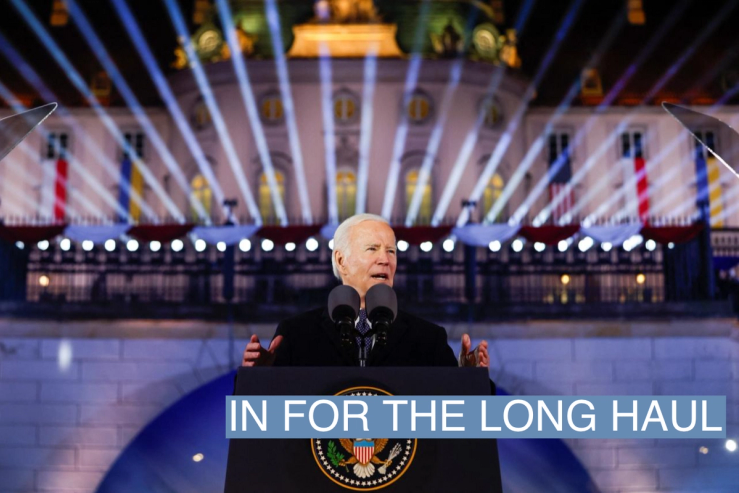The News

As the war in Ukraine enters its second year, the conflict looks ready to grind on indefinitely without any obvious path to peace.
Ukrainians are currently bracing for a renewed Russian offensive. Russian President Vladimir Putin is returning to disproven talking points about the West being the true architect of the conflict and vowing to suspend Russia’s participation in the last remaining nuclear arms control agreement between Moscow and Washington. And the U.S. and its NATO allies are sending more hardware to Ukraine while preparing new sanctions on Moscow, determined to squeeze and isolate Putin and his military.
“Ukraine will never be a victory for Russia — never,” President Biden said in a defiant speech from Warsaw on Tuesday, seeking to underline Western resolve to support Ukraine.
In this article:
Morgan’s view
Biden’s trip to Europe seemed aimed at rallying the international community — and the American public — for a long struggle ahead.
“There will continue to be hard and very bitter days,” he said Tuesday.
No one is talking like this war is ending anytime soon — at least not publicly. One EU official told reporters last week that they had “difficulty” imagining negotiations between Ukraine and Russia at this point, given that Putin’s war aims don’t seem to have changed and Ukrainian President Volodymyr Zelenskyy is facing an election next year.
Biden made a point on Tuesday to repeatedly place the blame for the war squarely in Putin’s hands, and put the onus on the Russian leader to end his invasion.
But there is broad skepticism about Putin’s willingness to come to the negotiating table in good faith. One European diplomat observed that Putin may be so intent on taking control of Ukraine that “there may be nothing short of that goal that he will ever settle for.” That could still mean he takes an opportunity for a ceasefire agreement, but then tries again at an invasion in a few years’ time.
The Biden administration believes it is in a good position to support Ukraine’s resistance through the coming months, after the last Congress approved tens of billions of dollars in security assistance that officials project will last through the current fiscal year.
The going could get harder, however, when it comes time to pass more assistance given the growing skepticism toward the war among conservatives. A cadre of Republicans, including Senate Minority Leader Mitch McConnell, appeared at the Munich Security Conference to challenge the idea that support for Ukraine is waning among the GOP. But a vocal minority of its House members have argued that resources spent on the war would be better redirected home, and their message appears to be breaking through with voters as it’s been picked up by some of the party’s potential presidential candidates.
Brett Bruen, a former U.S. diplomat who served in White House during the Obama administration, lauded Biden’s trip to Kyiv but argued that the president should do more to lay out a “game plan” going forward, which he said would help shore up support for any future assistance on Capitol Hill.
“It isn’t unrealistic for us to start putting some dates and some numbers on what we’re trying to achieve,” Bruen told Semafor.
Biden has also faced pressure to send fighter jets and longer-range missiles to Ukraine, which the administration has thus far resisted. Biden administration officials have been wary of sending weapons that could escalate the conflict, but some argue that deadlier gear and equipment will be necessary for Ukraine to prevail on the battlefield.
“If we continue doing what we’re doing, there is likely to be slow movement,” Bruen argued. “That doesn’t serve our interests because it will require strong political support to be sustained.”
Room for Disagreement
World leaders may not be talking publicly about finding a way to end the war, but there is evidence of more direct conversations happening behind the scenes.
The Washington Post recently quoted a senior Biden administration official as saying that the U.S. was trying to “impress” on the Ukrainians “that we can’t do anything and everything forever.” Joint Chiefs of Staff Chairman Mark Milley voiced concerns about the erosion of U.S. weapons stockpiles in an interview with the Financial Times, and suggested that it would be extremely difficult for the Russians or the Ukrainians to achieve their objectives.
Matt Duss, a former foreign policy adviser to Sen. Bernie Sanders, I-Vt. and visiting scholar at the Carnegie Endowment for International Peace, said that laying the groundwork for a peace agreement or ceasefire in the near future would be a logical step — and that the rate at which weapons and other hardware are being depleted on both sides would likely create an opening.
“It seems to me it’s going to be a few months off in part because that’s a point at which both sides are going to really see a shortage of material,” Duss said. “It’s difficult if not impossible to continue to supply at this current rate.”
The View From Ukraine
Zelenskyy has repeatedly rejected the idea of negotiations with Russia, telling Sky News in an interview last month that talks would only be possible once Putin pulls back his forces from their territory and there is a new government in Moscow.

